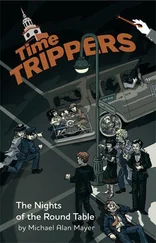“Precisely!” said Tanz.
“That’s where you’re wrong, General. As you well know, we’re speaking of someone called Hartmann—the only surviving witness of one of your crimes.”
“Who is Hartmann?” asked Tanz. Pin-points of cold fire danced in his eyes. “Or, rather, where is Hartmann?”
“Over there,” replied Prévert, pointing to the figure in the doorway.
Slowly, Tanz propelled himself forward. His limbs functioned stiffly and mechanically like those of a marionette operated by a novice. His body seemed to be hinged at the joints.
Prévert followed at his heels. The General moved with great deliberation, still determined to give an impression of dignified composure. This enabled Prévert to overhaul him without undue effort and made it look as though he were clearing a path for him. As he went, Prévert issued brief instructions: “Hartmann, look after Ulrike.”
“Frau von Seydlitz-Gabler, your husband will be in urgent need of your support.”
“Kahlenberge, come with me.”
Prévert opened the door leading to the ante-room and Tanz passed through, followed by Kahlenberge. Wyzolla jumped up from his chair and snapped to attention. For several seconds Tanz stood motionless as a mountain pine, seemingly unshakable despite the axe-strokes thudding against its base. Then he appeared to sway, but it was an illusion: he merely inclined his body a few millimetres towards Wyzolla.
“Give me your pistol,” he said.
Wyzolla obeyed the order exactly as he would have done if Tanz had asked him to produce a handkerchief. He reached into his trousers pocket and brought out an 8 mm. automatic.
“Loaded, sir. Safety-catch on.”
“Thank you,” said Tanz, taking it.
Wyzolla stepped back smartly. Where his General was, there was his parade-ground. Kahlenberge stared fascinatedly at the weapon in Tanz’s hand, then tore his eyes away and glanced at Prévert. Prévert shook his head very slightly.
Tanz lowered the pistol until it nestled in his hand with its muzzle pointing at the floor. Once more, he began to move. Wyzolla automatically started to follow, but Prévert said: “Wait here!” The words sounded like an order, and since they were uttered in the General’s presence they carried almost as much force as if the General had uttered them himself. Obediently, Wyzolla stayed where he was.
Tanz walked on down the corridor to the door of his room, where he halted. From behind, Prévert and Kahlenberge could see him brace his shoulders and raise his head, slowly, as though jacking it up. Then he turned to face them. In a choked voice, he said: “I have no explanation to offer.”
“Why should you have?” Prévert replied in an icy tone his friends would not have recognized. “There’s nothing to explain—Tanz!”
Tanz winced as though he had been stuck with a needle. The contempt with which his name had been uttered—just his name, no rank, not even the rudiments of civility, plain “Tanz” and nothing else—seemed to hurt him more than anything anyone had dared to do to him so far. His right eyelid twitched violently. He spun on his heel, flung open the door of his room and, stumbling inside, slammed it shut behind him.
“That’s it, I think,” Prévert remarked flatly. “Have you got a cigarette for me, Kahlenberge?”
Kahlenberge’s hand was unsteady as he proffered the packet. Prévert helped himself and struck a match. They both lit up, audibly exhaling the first gulp of smoke, their eyes fixed on the door which now hid Tanz from view.
They waited, each aware that further conversation was superfluous. Both men were breathing fast but neither was conscious of the fact. They smoked their cigarettes down to the butt and ground them out on the imitation Persian carpet, then lit fresh ones immediately.
Kahlenberge could hardly control his restlessness. “You’re really counting on him to behave like an officer and a gentleman?” he asked in an undertone.
“If you like to call it that—though officers and gentlemen aren’t the only people who know how to do the right thing.”
“Sometimes I wonder what category I belong to myself.”
“I’ll tell you what you are—an incurable idealist, though you probably wouldn’t admit it.”
They went on waiting, studying their feet and the carpet beneath, tracing its pattern until their gaze returned to Tanz’s door. Even when they turned and looked out of the corridor window their eyes met the reflection of the door, clearly mirrored in the glass.
At last the brooding silence was broken by a muffled report like the bursting of an out-size toy balloon. It was the sound they had been expecting for almost half an hour.
Kahlenberge started forward, but Prévert held him back. “Don’t rush it,” he said.
Prévert’s lips moved almost imperceptibly. He might have been praying, but it was more likely that he was counting. Being a practical man, he was giving Tanz time to fire again in case the first shot had proved ineffective. After about sixty seconds, he said: “Now!”
They threw open the door leading into Tanz’s suite. On the table was a tumbler and an empty vodka bottle, which had fallen over. Sticky wet traces of half-digested food, evidently the result of vomiting, led from the table to the carpet.
Tanz lay there in a puddle of blood with his skull gaping.
“C’est ça,” Prévert said tersely.
A SPEECH WHICH HAS BEEN OFTEN PONDERED BUT NEVER DELIVERED
From a soldier to his general: “A general commands thousands of men, thousands of whom he may never have seen, exchanged a word with, or learnt the names of.
“To generals, most of these thousands are no more than components of a battalion or brigade, faceless creatures who go to make up daily strength reports, items to be disposed of by a word, a signature or a command. One word from a general and thousands of soldiers stand to, move off, attack, withdraw, or march to their deaths.
“There is no other form of absolute power so great and all-embracing as that wielded by generals at a time when martial law and a state of emergency prevails. But, for the soldier, even the intervening periods are dominated by the figure of his general, regardless of whether he knows who his general is, where he comes from, where he is going, whether he is an unemotional pedant or a genial father-figure, a strict martinet or an equable personality, a daredevil or a temporizer.
“Generals are like shadows from which no soldier can escape. They define the boundaries within which their subordinates can operate. They also specify the objectives to be attained by divisions, corps and armies composed of finite numbers of men, finite numbers of weapons and finite quantities of ammunition—columns of figures headed simply “credit” and “debit,” the deductions being accounted for by dead, wounded, missing, sick, postings and transfers—only numbers, never names.
“This is so, was so and will always be so. It may be deplorable, but it is unavoidable. Wherever human beings conglomerate they lose their face, name and individual existence, whether in factory bays, football stadiums or barracks, the waiting-rooms of war.
“Generals, on the other hand, do have a name. Soldiers learn it by heart as soon as they come under a particular general’s command. They meet it again and again on written orders or when decorations and promotion are being conferred. It appears in military dispatches, is mentioned in newspaper articles or on the radio, and occasionally finds its way into books and, thus, into history.
“Generals also have a face. It occasionally glides past soldiers bound for the front or returning from it. It turns to look, for a fraction of a second, at rows of motionless figures standing to attention. It stares from publications or is captured in photographs destined to adorn the walls of billets or canteens.
Читать дальше












